Sunil Manohar GavaskarEarly life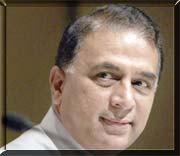 Gavaskar was broadly well-liked for his technique against fast bowling, with a mostly high average of 65.45 against the West Indies, who obsessed a four-spiked fast bowling attack regarded as the most ferocious in Test history. His captaincy of the Indian team, conversely, was less successful. The squad at one stage went 31 Test contests without a victory. There were unpleasant incident like crowd annoyance at Eden Gardens in Calcutta most important to multiple matches being interrupted, in reply to the poor concert of the Indian team. Chaotic performances of the team led to numerous exchanges of captaincy between Gavaskar and Kapil Dev, with one of Gavaskar's canvassing coming just six months before Kapil led India to success at the 1983 Cricket World Cup. Domestic debut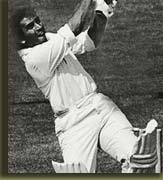 Test debutA wee player, Gavaskar stood at just 165 cm. gone astray the First Test due to an tainted fingernail; Gavaskar scored 61 and 67 not out in the second Test in Port-of-Spain, Trinidad, striking the winning runs which gave India its first ever win over the West Indies. He tracked this with his first century, 116 and 64* in the Third Test in Georgetown, Guyana, and 1 and 117* in the Fourth Test in Bridgetown, Barbados. He revisited to Trinidad for the fifth Test and scored 124 and 220 to aid India to its first ever series success over the West Indies, and the only one until 2006. His act in the Test made him the second player after Doug Walters to score a century and double century in the same game. He also became the first Indian to make four centuries in one Test series, the second Indian after Vijay Hazare to score two centuries in the same Test, and the third after Hazare and Polly Umrigar to score centuries in three successive innings. He was the first Indian to amassed more than 700 runs in a series, and this 774 runs at 154.80 remains the most runs gained in a debut series by any batsman. Trinidad Calypso singer Lord Relator (Willard Harris) carved a song in Gavaskar's honor.Gavaskar's advent in England in 1971 for a three Test series produced significant publicity in light of his debut series. He was powerless to maintain his show, making only two half centuries. He was involved in argument when taking a quick single from the bowling of John Snow. They smashed together and Gavaskar fell over. Snow was suspended. Gavaskar's 144 runs at the low average of 24, led several to question Gavaskar's worthiness in international cricket. In 1972-73, England explored India for a five Test series, Gavaskar's first on home soil. He was futile in the first three Tests, hoarding only sixty runs in five innings as India took a 2-1 lead. He scored a few runs in the final two Tests which India drew to complete successive series wins over England. His first home series was largely inadequate, aggregating 224 runs at 24.89. His English critics were appeased when India returned in 1974 and Gavaskar scored 101 and 58 in the First Test at Old Trafford. He coped 227 runs at 37.83 as India was whitewashed 3-0. Gavaskar's 1974-75 Indian was broken up, playing in only the First and Fifth and final Test of the series in opposition to the West Indies. He scored 108 runs at 27, with an 86 at Mumbai the flanking the Indian public got to witness a century. The Test was the beginning of a world record streak of 106 Test appearances. 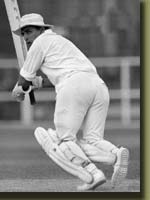 Gavaskar was not to get a century on home soil until November 1976. In an eight Test summer, three and five against New Zealand and England correspondingly, Gavaskar scored centuries in the first and last analysis of the season. The first was 119 in obverse of his home crowd at the Wankhede Stadium in Bombay, assisting India to a victory. Gavaskar scored one more half century in the Second Test to end the series with 259 at 43.16. In the First Test in opposition to England at Delhi, he was rambled upon becoming the first Indian to reach 1000 Test runs a calendar year. A stable series saw him finish with 394 runs at 39.4 with a century upcoming in Fifth Test at Mumbai and two half centuries. In 1977-78 he traveled around Australia, scoring three consecutive Test centuries (113, 127, and 118) in the second innings of the first three Tests at Brisbane, Perth and Melbourne in that order. India won the third but missed the earlier two. He refined the Five Test series with 450 runs at 50, failing twice as India lost the final Test and the series 3-2. 1978-79 saw India tour Pakistan for the first series between the archway rivals for 17 years. For the first time Gavaskar faced Pakistani captain and rapidity spearhead Imran Khan, who depicted him as �The most compact batsman I've bowled to." Gavaskar attained 89 in the First Test and 97 in the Second, which India drew and lost. Gavaskar accumulated his best for the Third Test in Karachi, scoring 111 and 137 in the Third, but was unable to avert a defeat and series loss. His identical twin centuries made him the first Indian to score two centuries in one Test on two occasions, and saw him exceed Umrigar as India's leading Test runscorer. Gavaskar had completed the series with 447 runs at 89.40. Captaincy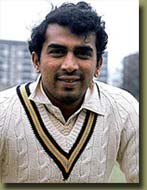 His first series in charge was a West Indian visit to India for a six Test series. Gavaskar's quite a lot of centuries compared with several failures. His 205 in the First Test in Bombay made him the first Indian to achieve a double century in India against the Caribbeans. He added a further 73 in the second innings of a high scoring draw. After failing to score in the Second Test, he scored 107 and 182 not out in the Third Test at Calcutta, an advance high scoring draw. This made him the first player in Test history to attain centuries in both innings of a Test three times. He handled only 4 and 1 in the Fourth Test in Madras as India vigor the only win of the series. He placed a fourth century for the series, scoring 120 in the Fifth Test at Delhi, fetching the first Indian to pass 4000 Test runs. He aggregated 732 runs at 91.50 for the sequence, saved India a 1-0 win in his first series as captain. In spite of this, he was naked of the captaincy when India visited England in 1979 for a four Test tour. The official basis given was that Srinivas Venkataraghavan was preferential due to his superior experience on English soil, but most observers believed that Gavaskar was punished because he was believed to be considering defecting to World Series Cricket. He started consistently, scoring four half centuries in five innings of the first three Tests. It was in the Fourth Test at The Oval that he produced his finest innings on English soil. India was 1-0 down desired to reach a world record target of 438 to square the series. They attained 76/0 at stumps on the fourth day. Directed by Gavaskar, India made steady advancement to 328/1 with 20 overs remaining on the final day with a record breaking success. Ian Botham lead fight back saw Gavaskar impassive, with India still needing 49 runs from 46 balls. With three balls left in the match, all four results were achievable. India finished nine runs short with two wickets in hand when stumps were drawn. According to Sanjay Manjrekar, it was �Vintage Gavaskar, playing swing bowling to excellence, taking his time at the outset and then opening up. Zero in the air, everything copybook." He ended the series with 542 runs at 77.42 and was named as one of the Wisden Cricketers of the Year. Gavaskar was renovated to the captaincy for the demanding 1979-80 seasons, with six Test home series against both Australia and Pakistan. The first two Tests in opposition to Australia were high scoring draws where only 45 wickets fell; with India taking a first innings direct in both after making scores over 400. India ruined through for a 153 run win in the Third Test at Kanpur, where Gavaskar scored 76. He made 115 in the Fourth Test in Delhi, where India was unable to adapt a 212 run first innings lead, ensuing in a draw. After another draw in the Fifth Test, Gavaskar scored 123 in the Sixth Test in Bombay, where Australia distorted by an innings after India placed their fourth first innings in excess of 400 for the series. Batting Performance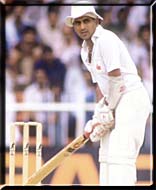 The 1980-81 spell saw Gavaskar returned as captain for the Australasian expedition, but it was to be the initiate of an unhappy period of influence for Gavaskar and India. He managed only 118 runs at 19.66 in the three Tests against Australia, but his bang in Australia was a notorious incident. At the Melbourne Cricket Ground, when Gavaskar was set out by the Australian umpire Rex Whitehead, he ordered his fellow opener Chetan Chauhan off the field. As an alternative of abandoning the match, the Indian manager, SK Durani convinced Chauhan to return to the game which India went on to win by 59 runs as Australia buckled to 83 in their second innings. India drew the series 1-1 but the following three Test series in New Zealand were to signal the start of a sterile run of 19 Tests under Gavaskar of which India were to win only one and lose five. India lost to New Zealand 1-0, with Gavaskar scoring 126 runs at 25.2. He completed the Oceania tour with 244 runs at 22.18, with only two half centuries, making little impact. The 1981-82 Indian flavors saw a hard-fought 1-0 series win over England in six Tests. India captured the First Test in Mumbai, before five following draws resulted, four of which did not even reach the fourth innings. Gavaskar made 172 in the Second Test at Bangalore and attained a half century on three further occasions to compile 500 runs at 62.5. India shared England's visit in 1982 for a three Test series, which was lost 1-0. Gavaskar made 74 runs at 24.66 but was powerless to bat in the Third Test. The 1982-83 sub continental seasons's happened well for Gavaskar on an individual note, as he made 155 in a one off Test in opposition to Sri Lanka in Madras. It was the first Test among the two nations, with Sri Lankan having only recently been rewarded Test status. In spite of this, India was powerless to finish off their apprentice opponents; the draw signed a start of a winless summer. India played in twelve Tests, losing five and sketching seven. The first series was a six Test visit to Pakistan. India started well sufficient, drawing the First Test in Lahore, with Gavaskar scoring 83. Pakistan then conquered India in three consecutive matches. In the Third Test in Faisalabad, Gavaskar directed an unbeaten 127 in the second innings to force Pakistan into a run follow, but the other two losses were significant, both by an innings. Regardless of holding on for draws in the last two Tests, Gavaskar was substituted by Kapil Dev as captain after the 3-0 loss. Despite his team's obscurities, Gavaskar stayed productive with 434 runs at 47.18 with a century and three half centuries. Gavaskar went on to the West Indies for a five Test tour wholly as a batsman, but could not replicate the form that he had shown in the Caribbean in 1971 and 1976. He coped up only 240 runs at 30, as India were trodden 2-0 by the world champions. Apart from a victorious 147 in the drawn Third Test in Georgetown, Guyana, his next finest effort was 32. 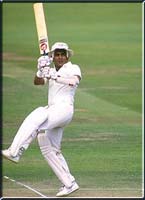 Gavaskar's 90 in the Third Test at Ahmedabad saw him exceed Geoff Boycott's Test world record of 8114 career runs was lacking to prevent another defeat. All through the Fifth Test in the series, India were crushed by an innings at Calcutta to concede a 3-0 series lead. India had won only one of their 32 most topical Tests and none of their last 28. The Bengali mass singled out the Marathi Gavaskar, who had made a fair-haired duck and 20. Angry viewers showered objects onto the playing arena and quarreled with police, ahead of pebbling the team bus. In the Sixth Test in Madras, he assembled his 30th Test century, with a victorious 236 which was the highest Test score by an Indian. It was his 13th Test century and third double century in opposition to the West Indies. He had combined 505 at 50.50 for the series. With India failing to win for 29 consecutive Tests, Kapil was fired as captain and Gavaskar continued headship at the start of the 1984-85 season. The two Test visit of Pakistan resulted in two more draws, with Gavaskar collecting 120 runs at 40. The First Test in opposition to England in Bombay adage India breaks through for its first Test victory in 32 matches. It verified to be a false dawn, with England squaring the series 1-1 in Delhi ahead of another notorious Third Test at Eden Gardens in Calcutta. The intimidating crowd observed as India batted for over two days to reach 7/437 after 203 overs. Angry with the slow speed of India's innings, the crowd repeated" Gavaskar down! Gavaskar out!" blaming him for India' performance. The home police chief seemingly asked Gavaskar to announce to soothe the angry crowd. When Gavaskar led his squad onto the field, he was pelted with outgrowth. Gavaskar promised never to play at Eden Gardens again, and duly withdrew from the squad for India's next fixture at the Bengali capital two years anon, ending his record of 106 consecutive Tests. The match was drawn, but India conceded the series after losing the Fourth. The series ended 1-2, and with a poor display of 140 runs at 17.5, Gavaskar reconciled, even though he had already announced his into to renounce the leadership before the series. The change of captain enhanced the form of neither Gavaskar nor India as they toured Sri Lanka for a three Test series. India was mortified 1-0 by the Test minnows, with Gavaskar administrating only 186 runs at 37.2. International farewellIn 1985-86, India traveled around Australia, playing against a team in a poor form crash. India was not capable to capitalize as all three Tests were drawn, but Gavaskar did. He gained an unbeaten 166 in the First Test in Adelaide and 172 in the Third Test in Sydney, ending the series with 352 runs at 117.33. A three Test tour of England saw him get only 185 runs at 30.83, which India won 2-0 notwithstanding his inefficiently. In 1986-87, Gavaskar's final period in Test cricket, India faced a long season of eleven home Tests. Against a side as the worst to leave Australian shores, Gavaskar made 90 in the second innings of the First Test in Madras, giving India an option of reach the target of 348, which ended in a tie. He achieved 103 in the Third Test in Bombay to end the sequence with 205 runs at 51.66.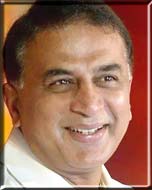 StyleGavaskar was also an excellent slip fielder and his secure catching in the slips facilitated him to become the first Indian (excluding wicket-keepers) to take over a hundred catches in Test matches. In one ODI beside Pakistan in Sharjah in 1985, he took four catches and aided India to defend a small total of 125. Untimely in his Test career, when India infrequently used pace bowlers, Gavaskar also opened the bowling for a squat spell on occasions if only one pace bowler was playing, before a three-pronged spin hit took over. The only wicket declared by him is that of Pakistani Zaheer Abbas in 1978-79.While Gavaskar could not be depicted as an attacking batsman, he had the ability of keeping the scoreboard marking with unique shots such as the "late flick". His focal point of technical correctness over panache meant that his mode of play was usually less appropriate to the shorter form of the game, at which he had less achievement. His prominent 36 not out in the 1975 World Cup, carrying his bat through the full 60 overs in opposition to England, lead Indian followers to storm the field and deal with him. Gavaskar approximately went through his career devoid of scoring a one-day century. He controlled his first (and only ODI century) in the 1987 World Cup, when he smack 103 not out against New Zealand in his last but one ODI innings at Vidarbha Cricket Association Ground, Nagpur. Outside cricketGavaskar has also been honored the Padma Bhushan. In December 1994 he was allotted the Sheriff of Mumbai, an honorary post, for a year. After giving up work, he has been a fashionable, if at times controversial commentator, both on TV and in print. Sunil has written four books on cricket - Sunny Days (autobiography), Idols, Runs n' Ruins and One Day Wonders. He also served up as an advisor to the India national cricket squad during the home series in opposition to Australia in 2004. He was the Chairman of the ICC cricket committee till the moment he was forced to choose between commentary and being on the committee. He left the commission to continue his career as a broadcaster.His son Rohan is also a cricketer who cooperates at the national level in the Ranji Trophy. He has played a few One Day Internationals for India, but could not strengthen his spot in the team. The Border-Gavaskar Trophy has been organized in his (co-)honor. 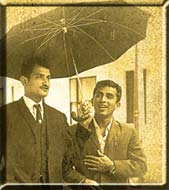 Personal lifeSunil is married to Marshneil Gavaskar, offspring of a leather industrialist in Kanpur. They have a son Rohan. Sunil Gavaskar also played a daring role in the 1993 Bombay Riots, where he secluded a Muslim family. He also fortified victims with his body, saying "first you have to hit me" to the rioters. |

Common Games Of India || History Of Games& Sport || Pre School Games || School Games || Games For Girls & Women || Team Games

